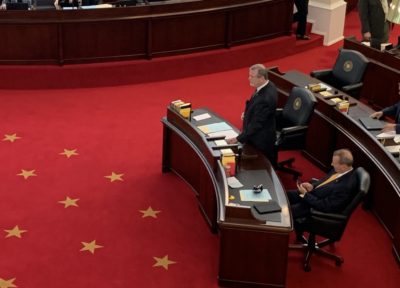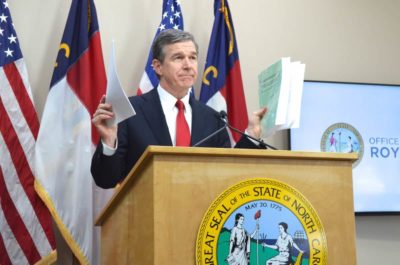Welcome to Awake58! If you missed the previous newsletter that examined the Governor’s budget, click here. If you were forwarded this newsletter, please click here to subscribe.
myFutureNC lays out their policy recommendations… IEI is hosting a forum on higher education, including community colleges, in September… The Dallas Herring Lecture is going virtual. Details below…
“Educational attainment is the path to the short-term recovery and long-term resiliency of North Carolina.”
Cecilia Holden, the CEO of myFutureNC, presented an update on the statewide attainment goal to the Joint Legislative Education Oversight Committee (JLEOC) last week. Holden’s opening remarks positioned the work of myFutureNC as key to the future economic progress for our state. The quote above was both how she opened her remarks and the anchor for her message to the committee.
HB 664, which passed last year in support of the statewide attainment goal, included a section asking myFutureNC to report on the progress towards the goal each September.
As you probably recall, myFutureNC is a nonprofit that is carrying the torch for a statewide attainment goal developed by the myFutureNC Commission. The Commission was a statewide, nonpartisan effort comprised of leaders from across the business, government, and educational sectors. The Commission conducted a statewide listening tour, surveyed North Carolinians, produced policy briefs, and invested in research in order to establish our statewide goal.
The end result was a goal of 2 million 25-44 year-old North Carolinians with a high-quality credential or postsecondary degree by 2030.
Key points from Holden’s presentation included:
→ NC has made progress towards the goal. The original projections of the Commission anticipated 1.6 million North Carolinians achieving the target of a high-quality credential or degree by 2030. According to Holden’s report, the new projection has 1.7 million North Carolinians attaining the same — leaving a gap of 300,000.
→ They have hosted cross-sector convenings and continued to engage the sectors as the work has progressed.
→ They launched their state-level attainment dashboard that showcases the state’s progress on key indicators towards the attainment goal.
→ They just published county-by-county data profiles that show where counties sit data-wise on the same key indicators and list opportunities for growth. The hope is that local leaders will be able to use data and recommendations to power progress on the local level.
→ The #FAFSAFrenzy campaign in June included buy-in and support from key education and government leaders across the state.
We will continue to report on the work of myFutureNC in the weeks and months to come. Below you will find a few other key elements from the presentation, including their policy recommendations for the next legislative session.
I would love to hear from you regarding your own thoughts around the attainment goal, the localized data profiles, and what more could be done to help the state reach the 2 million by 2030 goal. Text COLLEGE to 73224, email me back directly, or tweet us @Awake58NC.
See you out on the road,
Nation Hahn
Head of Growth, EdNC.org
Policy recommendations from myFutureNC for the next legislative session
myFutureNC’s presentation positioned the statewide attainment work as part of a statewide recovery strategy for coming out of our latest economic downturn and the COVID-19 pandemic. Throughout the presentation to JLEOC, Holden pointed to the connection between the economy and education.
Holden presented the following policy recommendations:
→ Expand access to broadband. “Access to broadband is the foundation for success for all initiatives and outcomes related to postsecondary readiness, access, completion, and alignment.” They made the point that 22% of NC households do not have broadband access in the home.
→ Increase the commitment to “Career and College Ready Graduates.” According to Holden’s presentation, “55% of the 396,000 students who are in grades 3-8 did not earn a college and career ready score on the end-of-grade reading exam.” Practically speaking they are calling for supports for staff, investments in professional development, and student access to the online platform for remediation.
→ A focus on access through increasing awareness and access to advising on both career pathways and financial aid. This takes the form of expanding College Advising Corps’ presence in NC and expanding NC Community College career coaches.
→ Focus on the FAFSA. Holden pointed out that 36% of our high school seniors in 2019 did not complete the FAFSA application. Holden said that estimates have shown a potential $89 million in federal Pell grants were not tapped in 2019 in NC as a result. Increasing FAFSA completion rates has been tied to increasing attainment rates. This recommendation asks for adequate staffing to focus on FAFSA completions, a FAFSA awareness campaign including virtual advising, and incentives for local districts to bolster completion rates.
→ Reform public need-based financial aid programs in an effort to support an increase in degree completion for those students who do enroll. This recommendation includes targeted student aid for part-way home students (i.e. some college, no degree) and simplifying student aid programs.
For the full recommendation document, click here.
Around NC
The Institute for Emerging Issues is hosting their next ReCONNECT forum virtually on September 24th. The event is titled: Impact on Higher Education and the Future of Work. They will discuss the 2030 attainment goal among other topics. IEI writes, “This meeting will examine what we are learning about the impact of COVID-19 in higher education and how colleges and universities are adapting in the near-term to meet the needs of students in an inclusive and equitable way. We’ll also hear about how institutions of higher education are reimagining future approaches to support students, businesses and their communities.” Early bird registration is open through September 11. To RSVP, click here.
From the Belk Center at NC State, early notice of the next Dallas Herring lecture: “NC State University’s College of Education Belk Center for Community College Leadership & Research is pleased to host the 2020 Dallas Herring Lecture on Tuesday, November 10th from 1-3pm. Dr. Pam Eddinger, President of Bunker Hill Community College, will be sharing her thoughts under the title of Insights from the Pandemic: The Reckoning and the Hope at Our Nation’s Community Colleges. Please register for the event to learn how to attend the Lecture and engage with us virtually on Tuesday, November 10.”
The Asheville Citizen-Times published an Op-Ed recently that you might wish to read. The piece, titled “The case for community colleges, now more than ever,” spotlights Southwestern Community College and A-B Tech. The author writes, “I wince every time I view one of those TV commercials for a for-profit vocational school. Too often, such schools leave their alumni with minimal job prospects and a lot of student-loan debt. Don’t fall for those spiels. You will get better education at far less cost through a community college.” Check out the op-ed by clicking here and let us know your thoughts!
Sign up for more from EdNC.org!
Sign up for all of our EdNC.org newsletters for all of the latest news and information.
A lot is happening in early childhood education! Sign-up for Early Bird to receive the latest news — including the latest information on early childhood educator prep.
Every single day, we cover the biggest stories affecting all of our students. Sign up for the Daily Digest to receive the news each morning!
For a weekly rundown on important stories from across North Carolina, subscribe to EdNC’s Weekly Wrapup.
Policy research, trends, and analysis from around the country have an impact on our state. Subscribe to Friday@5 to find out the latest each week!





